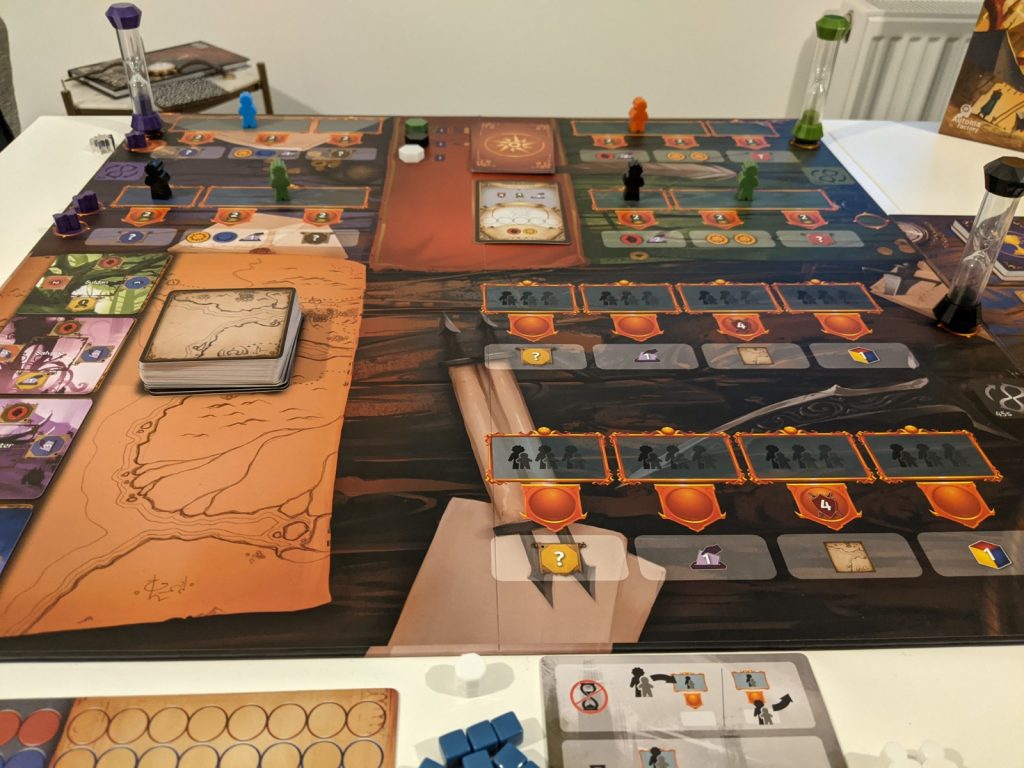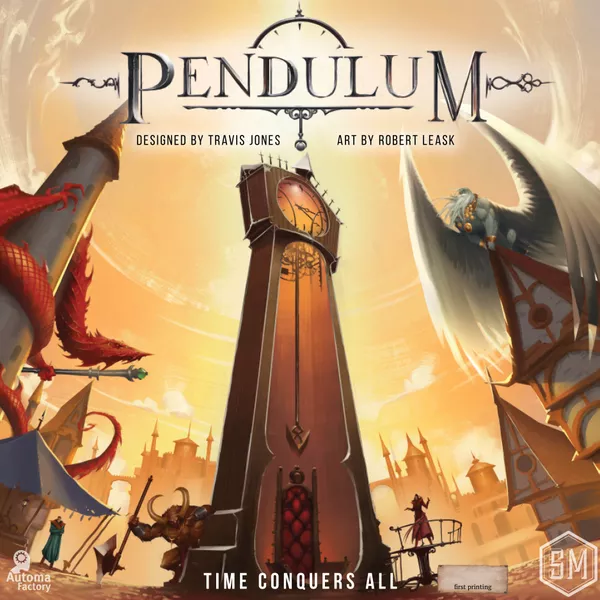The Timeless King has fallen, and the land of Dunya is in disarray. You believe you can be the one to bring order to this broken kingdom, but to do that you will need power, prestige and prosperity. Can you rise above your rivals and claim Dunya as yours?
Pendulum, designed by Travis Jones and published by Stonemaier Games, is a real-time, worker placement game where players will take their actions simultaneously. Through strategy and opportunism, the player who manages their time the most efficiently will emerge victorious. However, can Pendulum stand the test of time in a crowded worker placement field?

The first thing you will notice when you open Pendulum is that the production quality is to the usual high standard set by Stonemaier games. The cards and rulebook are linen lined and the board is thick. The worker meeples and resources are plastic, personally, I prefer wooden components as I think that they have a more ‘timeless’ quality but that is nitpicking. The player boards on which you will track your resources are frosted plastic, which I haven’t encountered in a game before. The positive of these is that they don’t take up a lot of room in the box as they are very thin, and they won’t fray in the same way that cardstock or cardboard would. The downside I found is that they are, for lack of a better term, ‘slippy’. There were a couple of occasions where the table got knocked and the pieces would slide around on the mat. This is problematic as your player board is where you track your progress on each of the different tracks and this ultimately decides who wins, so pieces getting knocked off isn’t ideal.
My other slight issue with the components is the overall look of the game. The character design is colourful and engaging but I don’t get a sense that these characters all belong in the same universe, they all feel a bit disparate. Furthermore, the central board itself looks bland and uninspired. I understand that this is a difficult balance to strike for worker placement games as the actions for each spot need to be apparent whilst maintaining an attractive look. It is even more important in Pendulum given the real-time nature of the game as players will often have to act quickly and need to be able to read the board state at a glance, to its credit, the iconography is excellent and I never had any trouble understanding what to do in any location, but I do think more could have been done to make the board more visually striking.
:strip_icc()/pic5600810.jpg)
Regarding the gameplay, as mentioned above, this is a worker placement game whereby players will be sending their meeples to different locations on the board to gather resources with the aim of converting those resources into progress on the game’s four tracks; power, prestige, prosperity and the legendary achievement.
However, unlike traditional worker placement games where everyone sequentially places their workers and then there is a recall phase where players get their workers back, Pendulum is markedly different in that players will simultaneously take actions, moving their workers around the board and the round structure is much more fluid.
Each area of action is controlled by a matching colour sand timer. Black is the quickest, so you will likely be carrying out those actions most frequently, but they are also the weakest actions available. Green is in the middle, with moderate benefits and usually a small cost to pay to take the action. Purple offers the greatest benefits, but the timer is the longest, meaning you really need to commit to that area as you will lose your worker for a significant portion of the round.
Each character is asymmetrical in that the length of each of their tracks varies, meaning they need to focus on different areas, and each comes with a set of four unique stratagem cards which offer powerful benefits that can be played at any time, and recollected from the discard pile by paying resources. There is also an advanced side for each character board, which offers new stratagem cards and unique player powers.
The game is played over four rounds, and the end of each round is triggered when the purple timer has been flipped for the third time. At this point, the players ‘call council’ whereby they compare the number of votes achieved that round (one of the game’s main resources), and the leader moves to the top of the prestige track and can take the first pick of the end of round reward cards. I like this system as it encourages trying to be first as some rewards are, by design, much stronger than others, but as everyone gets a reward regardless it isn’t too much of a gut punch if you get pipped by a couple of votes. The rewards are either a one time benefit or a new stratagem card that is added to your hand for the rest of the game. Alternatively, players can upgrade a worker to a grande worker as a reward meaning it can share the same space as other workers, but only one player can select this per round, which again incentivises winning.
:strip_icc()/pic5613299.jpg)
I do think there are things to like about Pendulum’s mechanisms. The cadence is unusual in that you can only assign workers to spaces that don’t have a timer, and can only take actions on spaces with a timer, so it rewards careful planning as much as sheer opportunism. The small engine building opportunities in the game are also strong as you can claim province cards which tuck under your player board, upgrading each of your four standard banner actions, which is satisfying.
However, all too often I found myself either stressed and hurried or conversely with too much time on my hands and waiting for a timer to expire so I could resume the game, neither of which was particularly satisfying. I also find that the game lacks any real sense of theme. The rulebook comes with significant flavour text and the premise is that you are various powerful members of society vying for the throne, but ultimately the game boils down to converting resources as efficiently as possible and moving up four non-descript tracks. I never felt the mechanisms of the game connected to the theme or drew me into the world they were trying to create.
It is worth noting that the game does come with a non-timed variant, where players still play simultaneously, but the timers are moved at specific intervals, rather than when they expire. Jamey Stegmaier stated in a recent YouTube post that he wishes they had made this the default mode and included the timed option as a variant instead. I’m unsure how I feel about this as the real-time aspect is one of the game’s main unique selling points, but I also understand that it will have turned many people away simply at the notion of real-time.
:strip_icc()/pic5613301.jpg)
As is standard with Stonemaier products, the game also includes a solo mode designed by The Automa Factory, where you compete against two AI players, with their actions and points they accrue dictated by a deck of cards. The solo mode is very well designed, simple to run and provides various difficulty options to tailor it to your liking. Although I wouldn’t necessarily recommend this if you only wish to play solo if you like the base game’s mechanics it is a solid inclusion, though it should be noted you can only play the solo mode with the timed mode, not the untimed variant.
Pendulum in Summary
I really admire the design of Pendulum for taking a risk and trying something genuinely fresh and new in the worker placement genre. There is a lot to like about the game and I am sure it will find a permanent place in many gamers’ collections as it feels wholly unique. However, it didn’t quite hit the mark for me. The lack of theme, and timers giving me a feeling of either having too much time or not enough, meant it was a game that I ultimately came away from a little disappointed.
Disclaimer: A review copy of Pendulum was provided by Stonemaier Games.

